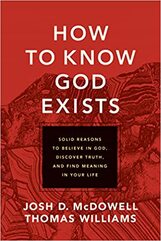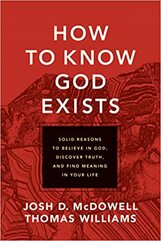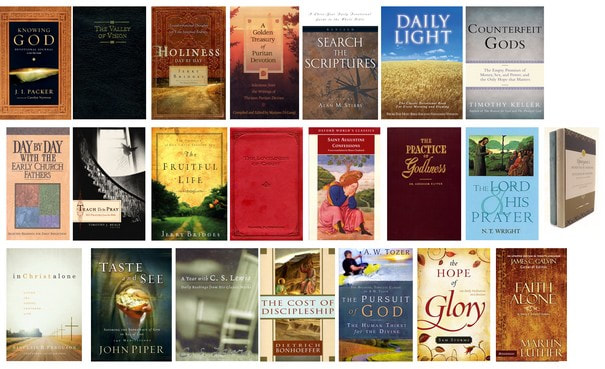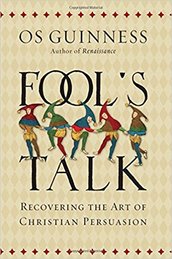
Yes, hot off the press, Josh McDowell has a new book coming out on Nov 22nd. You can pre-order here: amzn.to/3C0nb5c
Josh McDowell, the master of Evidentialism, teams up with Thomas Williams for a new type of book that tries to reason with the modern reader that God must exist. Unlike McDowell’s other books, this one isn’t meant to be a handbook for the Christian apologist. It seems more apt to use it in a small “seekers” group, as discussion questions are provided at the end of each chapter (I don’t know if this is a feature in the final version of the book).
The introductory chapter is a very lengthy and needless attempt to show the history of how we arrived at our ridiculous postmodern state of godlessness, through the Reformation, Enlightenment, and the Modern era. However, its assessment of today’s conflict between Secularism and Christianity is accurate. It’s apparent that the intended audience for this book are non-Christians faced with the stark reality of the Transcendent but don’t know how to approach it logically.
Part 1 makes a strong argument that truth is not relative. The evidence is that all of humanity has an intrinsic desire for purpose and meaning. Uncharacteristic of “classic McDowell,” he draws the reader into an Absolutist worldview using Presuppositional apologetics. Observable reality shows us that we live in a world bound by various standards that were not subjectively invented by humanity. Even musical standards of harmony and dissonance were not invented by Music Theory, merely discovered and explored. Again, although the nomenclature of “2+2=4” was invented, the mathematical reality existed before man. Our existing reality is so consistent in its adherence to these absolutes, that “subjective truth” will always conflict with the experience of reality. Who or what created these standards which were uninfluenced by humans? In a similar vein, morality is not natural nor can it be a product of nature. Universal morality is proof of the supernatural God.
Part 2 is an attack on Naturalism, from the Big Bang to Darwin’s Theory of Evolution. Hundreds of books have already been written on this popular Christian Apologetics topic. However, the authors do a good job of summarizing what we know and what we don’t know, casting doubt on what people hold to be settled science. There is not enough empirical evidence in itself to declare either Naturalism or Christianity as proven fact. Both require faith and reason. Faith is blind without reason, but reason has no direction without faith. Thus, faith and reason must necessarily go hand in hand to discover and ascertain truth.
I think it is here that the authors have disconnected with the audience. They haven’t proven decisively that postmodernism is futile in its search for real meaning, but their strategy is to move on and attack the vestiges of Naturalism that some postmodernists hold onto. Their mistake is to assume that postmodernists are Naturalists. The only reason some of them hold onto Evolution Theory is because they deny the alternative – Theism. However, a majority of postmodernists are turning to Pantheism or Panentheism. This is not the 20th century.
In Part 3, the argument seems like: without God, life has no meaning. Life should have meaning. Therefore God exists. Although this is a disappointingly weak argument, Naturalism offers even less. The only thing Naturalism posits is the dreary pointlessness of anything and everything: there is no purpose; just atoms bouncing around. Beauty and love have meaning only in light of God’s existence, and science can test neither of these.
Essentially, this book is a philosophical tirade against postmodernism. The last chapter is a beautiful and logical presentation of the gospel. It proves its purpose as a conversation with the postmodern unbeliever. Unlike classic Evidentialism, it feels like a J.P. Moreland book. It's worth reading. I recommend it.
I would like to thank Tyndale Publishers for an advance copy of this book.
Josh McDowell, the master of Evidentialism, teams up with Thomas Williams for a new type of book that tries to reason with the modern reader that God must exist. Unlike McDowell’s other books, this one isn’t meant to be a handbook for the Christian apologist. It seems more apt to use it in a small “seekers” group, as discussion questions are provided at the end of each chapter (I don’t know if this is a feature in the final version of the book).
The introductory chapter is a very lengthy and needless attempt to show the history of how we arrived at our ridiculous postmodern state of godlessness, through the Reformation, Enlightenment, and the Modern era. However, its assessment of today’s conflict between Secularism and Christianity is accurate. It’s apparent that the intended audience for this book are non-Christians faced with the stark reality of the Transcendent but don’t know how to approach it logically.
Part 1 makes a strong argument that truth is not relative. The evidence is that all of humanity has an intrinsic desire for purpose and meaning. Uncharacteristic of “classic McDowell,” he draws the reader into an Absolutist worldview using Presuppositional apologetics. Observable reality shows us that we live in a world bound by various standards that were not subjectively invented by humanity. Even musical standards of harmony and dissonance were not invented by Music Theory, merely discovered and explored. Again, although the nomenclature of “2+2=4” was invented, the mathematical reality existed before man. Our existing reality is so consistent in its adherence to these absolutes, that “subjective truth” will always conflict with the experience of reality. Who or what created these standards which were uninfluenced by humans? In a similar vein, morality is not natural nor can it be a product of nature. Universal morality is proof of the supernatural God.
Part 2 is an attack on Naturalism, from the Big Bang to Darwin’s Theory of Evolution. Hundreds of books have already been written on this popular Christian Apologetics topic. However, the authors do a good job of summarizing what we know and what we don’t know, casting doubt on what people hold to be settled science. There is not enough empirical evidence in itself to declare either Naturalism or Christianity as proven fact. Both require faith and reason. Faith is blind without reason, but reason has no direction without faith. Thus, faith and reason must necessarily go hand in hand to discover and ascertain truth.
I think it is here that the authors have disconnected with the audience. They haven’t proven decisively that postmodernism is futile in its search for real meaning, but their strategy is to move on and attack the vestiges of Naturalism that some postmodernists hold onto. Their mistake is to assume that postmodernists are Naturalists. The only reason some of them hold onto Evolution Theory is because they deny the alternative – Theism. However, a majority of postmodernists are turning to Pantheism or Panentheism. This is not the 20th century.
In Part 3, the argument seems like: without God, life has no meaning. Life should have meaning. Therefore God exists. Although this is a disappointingly weak argument, Naturalism offers even less. The only thing Naturalism posits is the dreary pointlessness of anything and everything: there is no purpose; just atoms bouncing around. Beauty and love have meaning only in light of God’s existence, and science can test neither of these.
Essentially, this book is a philosophical tirade against postmodernism. The last chapter is a beautiful and logical presentation of the gospel. It proves its purpose as a conversation with the postmodern unbeliever. Unlike classic Evidentialism, it feels like a J.P. Moreland book. It's worth reading. I recommend it.
I would like to thank Tyndale Publishers for an advance copy of this book.









 RSS Feed
RSS Feed
